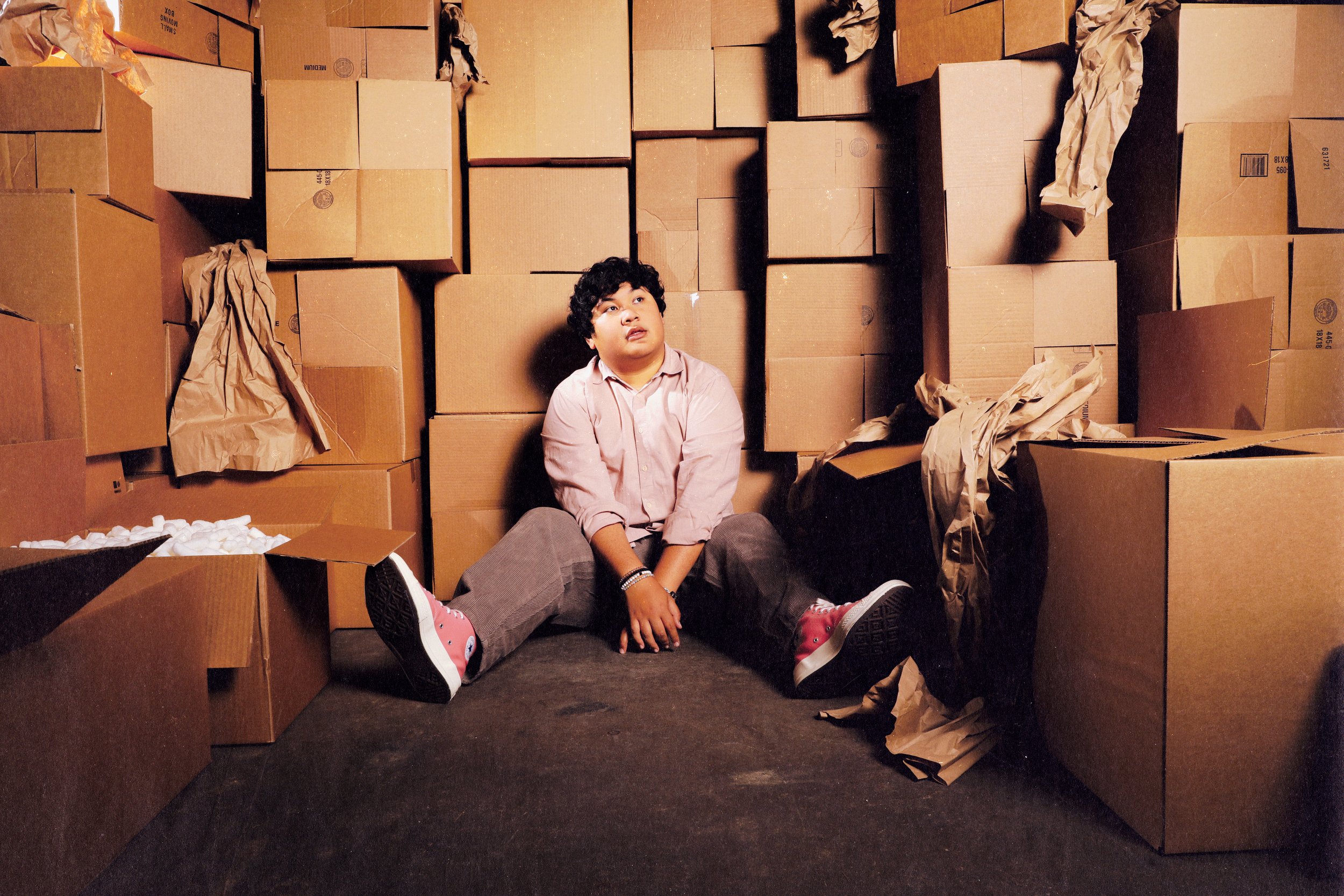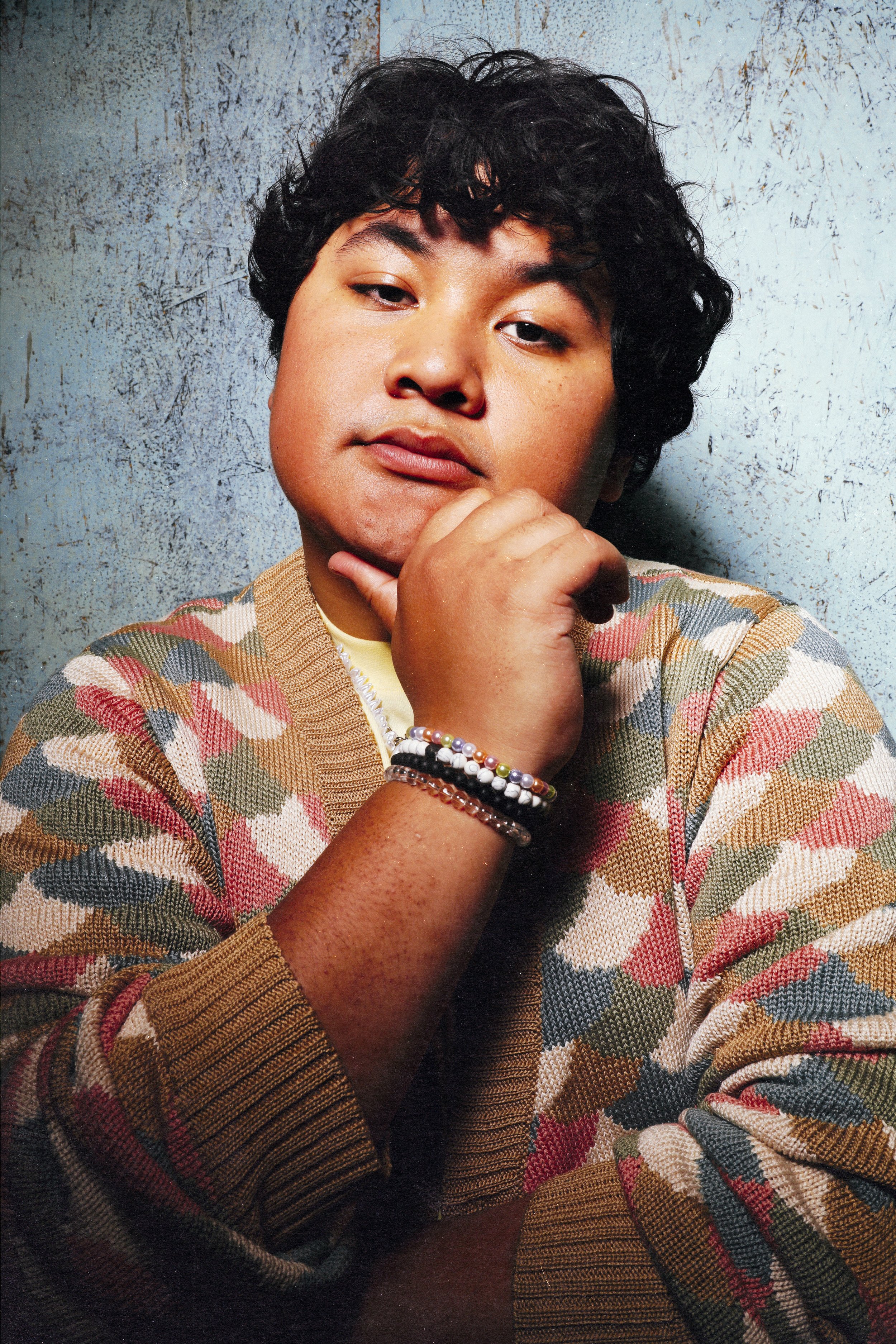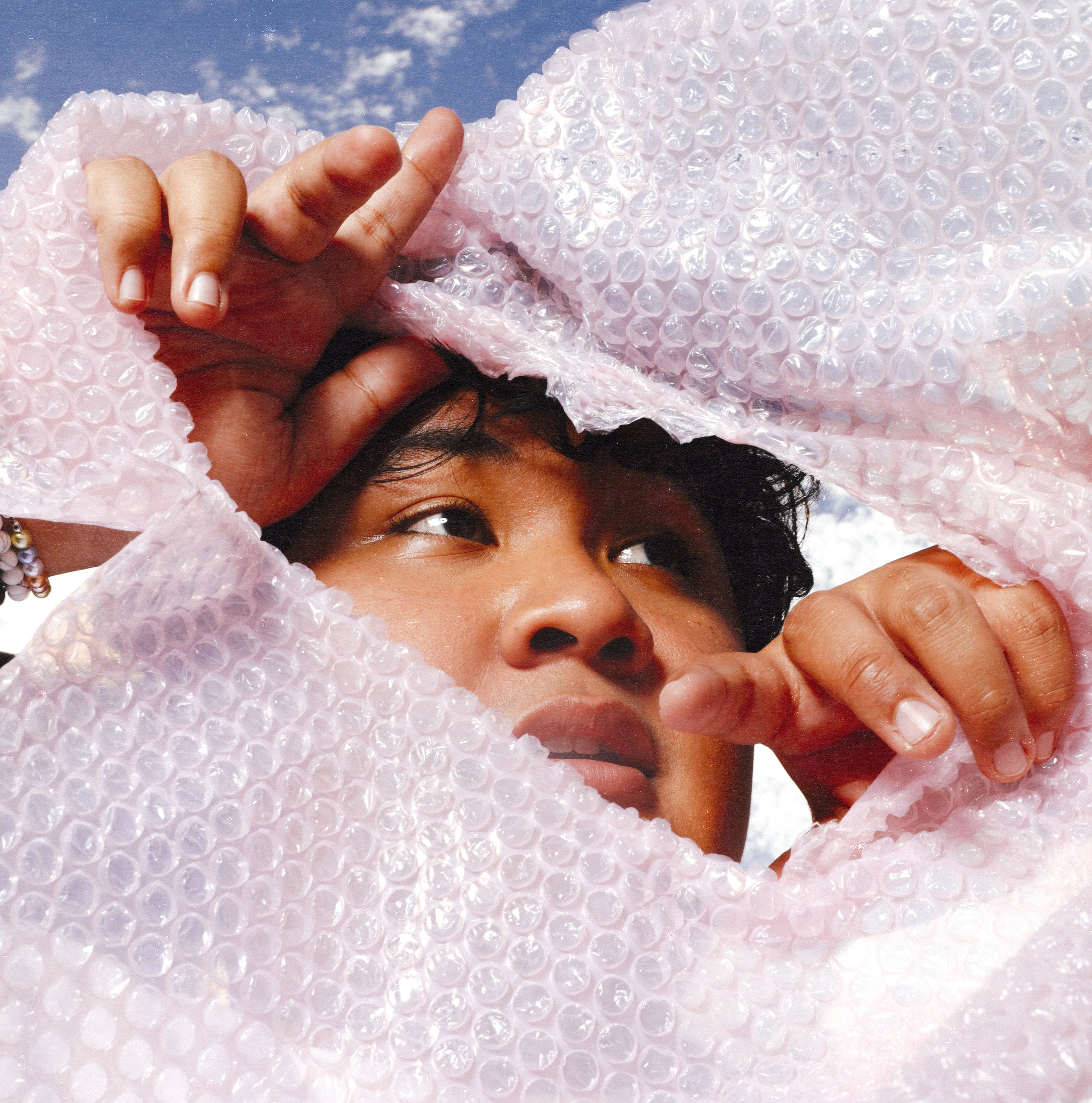Francis Karel Talks How the Pandemic, Omegle and TikTok Launched His Debut EP, 'Handle With Care'
Photo by Callum Hutchinson / Courtesy of the artist
Twenty-three year old singer-songwriter Francis Karel went viral on TikTok for posting videos of himself performing with his guitar to strangers on Omegle, an online video chat website. For every stranger pleasantly surprised by his powerful vocals, there is a larger audience of 2.3 million followers on TikTok astounded and captivated — not only by his sound, but also the entertaining reactions of these strangers listening to him.
Originally designed to allow users to talk to strangers, the site reached the height of its popularity in 2013 and declined when a lack of moderation created a potentially unsafe environment for minors. But in the thick of the pandemic, Gen Z gave Omegle a comeback. An influx of young people came to the site and formed what might resemble real connections during a period of intense isolation, and content creators found a new avenue to engage with an audience. With an expert command of social media, Karel found an audience for his music within this trend.
It might feel strange to sing to a camera, to be anticipating a response from a stranger but Karel has been hardened by past experiences. As a teenager, he used to sing competitively and perform at shopping malls in his hometown of Jakarta, Indonesia. With time, and the onset of the pandemic, the wafting scents of cheesy sweet corn cups, crepes and other mall snacks were traded in for the four walls of his own bedroom, and the blue light of his laptop screen. Despite the change in location, the anxiety and anticipation as a performer is familiar. Just as a stranger at the mall might walk away without appreciating the show, a stranger on Omegle can easily press the escape key. For every chance that a performer might overhear a snarky remark from a passerby, there are just as many comments callously posted on social media.
While the internet has democratized music for our generation, the mechanisms of the attention economy have made it increasingly difficult for artists to hold on to an audience’s attention. Artists have also become content creators; there’s a sense of urgency like never before, a pressure to produce. You only have so much time before the flick of a finger — the swipe, the scroll, the escape key.
A pair of eyes playfully peek out of a blanket of bubble wrap; the artist’s whole body is surrounded by it. The cover of Karel’s debut EP, Handle With Care, embodies many of the themes explored in his heartfelt songs about falling in love for the first time, but it’s more so indicative of this moment in global music that made it possible for the now Los Angeles-based artist to rise so rapidly. It’s a reminder of what it means to be a singer-songwriter in the age of Amazon Prime — of access, and of having anything you think your heart might desire available on demand.
In conversation with Sunstroke Magazine, Francis Karel talks more about navigating the internet, an artist’s intentions, and what it takes to find the feeling of connection through music. Falling in love should be handled with care. So should creating art in the age of the internet.
This interview has been edited for length and clarity.
Photo by Callum Hutchinson / Courtesy of the artist
What got you to start going on Omegle and performing your music to strangers there? Walk me through your thought process.
At the end of 2020, I saw a random person on my For You page on TikTok doing comedy skits on Omegle. They were just entertaining strangers and having fun. I haven’t been on Omegle since I was in middle school. When I saw that TikTok I thought, “Oh my god, I forgot about this.” And then I thought, “Well what if I started to sing on there?”
Everything was still in lockdown. In person events weren’t even a thing until mid-2021. I felt like it could be a good way to connect with strangers. Sometimes I even asked my followers to hop on and meet me there, instead of just me going live and talking to hundreds of people. I didn’t realize it would have this big of an impact on my career. I’m sure other people have done this, I can’t be the first person to sing to strangers on Omegle. I just got really lucky and the moment was right.
How would you compare what it feels like as an artist to be performing for strangers in a shopping mall when you were younger, versus performing for strangers on Omegle now?
I think the reason I got so nervous performing when I was younger is that I wasn’t intentional with my performances. I enjoyed it, but I didn’t really know what I was doing. On TikTok, a lot of people have given me a voice and a platform, so I’ve taken the time to really figure out what I want to say with my art. I’d say the difference, now that I perform with intention, is that I’m not as nervous. You don’t know me, but here is what I want to share, and hopefully it’s something that resonates with you. It’s not just, “Hey, I can sing!”
Your career really took off during the pandemic. Now that you’ve also performed at live venues, having opened for MAX and Andy Grammer, what are your thoughts on virtual concerts?
It’s an interesting concept. Livestreams are livestreams, but I never really thought about what a virtual concert could be before. I’ve done a couple now though. [...] There, for sure, is a huge difference between virtual and live performances. You feel so much more alive when you’re able to connect with an audience in person. It’s so hard to try to replicate that when you’re performing on livestream. You have to work harder to get yourself into the headspace of believing that there is an audience on the other side of that screen. As an artist, you really have to tap into your intentions and the intentions of the song in order to perform. That comes more naturally in a live performance.
Whenever I’m performing live as an opening act, I’m always surprised by how supportive an audience is and how much they’re rooting for me. I always assume — and I don’t know why this is always my mindset — but I always think that people aren’t going to like me. They’re just waiting for me to finish so that they can get to the main performer. It’s nice to see how completely wrong I am about that, to perform live and see how supportive people actually are even if they don’t know your music. Being able to connect with people and see their first impressions of you, that first reaction isn’t something that you can see as an artist at a virtual concert. You might still get reactions, you’ll see it in the chats, but it’s not something that you get to really hear or feel.
You have a very impressive handle on how to create content, garner attention, and work with the social capital you’ve acquired. What are your thoughts on being an artist in the digital era, where you have to be both an artist and a content creator?
Social media is so quick-paced. It’s so cool to see so many opportunities for independent and upcoming artists, but at the same time, everyone is looking for the “new thing” on social media. That creates certain expectations for artists. There are so many people playing in this space now. Looking at it positively, everyone is here to support someone new. But then those “new” people everyone is supporting can get old. Then they look for someone new to support. It’s a cycle.
I don’t think that’s a bad thing, but I do think that it creates a certain pressure for artists. We have to release our work, to say the thing we want to say before we no longer have that opportunity to say anything. Before, artists could take their time and work at their own pace. But now, everyone has to be like, Okay, we wrote this. Let’s put it out in two weeks. You’re always trying to chase the momentum. It’s an interesting space to be a part of today. For sure, I’m grateful for it. But I’m still learning how to navigate all of this.
When you think about your audience, what are you imagining? Is it the faces of a crowd at a show? Is it the people who engage with your work on social media?
I see my audience as my friends. Which is weird and can be overwhelming, considering the number of people I have following me on social media. But I love that I get this opportunity to connect with people. Like, “Thank you for liking me, but why do you like me?” You know, I was just someone born and raised in Jakarta, trying to figure out music. Somehow, I’m now in L.A., connecting with people from different parts of the world and they’re listening to my music. It’s still such a weird experience. Someone asked me about my “fans” and that was so off-putting for me. I was like, “Do you mean my… friends?”
I love how I get to tell stories through my songs and the things that I share on social media, to see how what I share can resonate with people. Sometimes they even give me feedback and life advice, which I didn’t expect. They’d be like, “You should try doing this!” And I’d be like, “You know what? Maybe I will.” Although some life advice I’ve received has been completely off track and I’d be like, “…I won’t do that. But also, let’s talk about this. I’m concerned for you.”
Concerned?
So a lot of my songs lately … [laughs] I’ve been trying to be more transparent about my emotions in my music. Some of those songs describe behavior that isn’t quite the best. But it’s what happened. I don’t want to change the narrative. I want to be as honest as possible.
People then listen to that and say, “This is what I think about what you’re doing,” which is what I like about making music — when people have opinions, and want to share their own feelings after listening to a song. But there are some people who … feed the fire. For example, in my song “Small Talk,” I wrote about how I went through a phase of being a people pleaser in romantic situations.
Some people gave me life advice that was like, “Honestly, I think it’s actually worth it. You should just keep doing it. I know it hurts, but in the end, it’ll be worth it!”
And I’m just like, “Uhh… I don’t think so. I see where you’re coming from, I too can be a hopeless romantic, but not in this situation!”
Handle With Care EP Cover / Courtesy of the artist
Talking about the songs on your new EP, where did the idea for Handle With Care come from?
My love life has always been dead. [laughs] I had always been so committed to music and work — it’s why I moved to L.A. — so I’ve always put anything romantic to the side. I kept wondering whether I was catching feelings just because I wanted to feel something or if I was actually ready for something real.
In 2021, I met someone. That really threw me for a loop. And then I couldn’t write about anything else. I couldn’t think about anything else. It was so weird. I had never felt that way about anyone, where it’s so consuming.
I don’t think I was scared of falling in love. [...] I guess I am scared of falling in love. I take what I said back. [laughs] I was scared of being heartbroken, of being so consumed by heartbreak that I might never be able to write music again. So that’s the place where Handle With Care comes from. I’m so afraid, but I still want to feel this. I still want to feel love, to be loved and to give love.
What is the sharpest memory you have of making this EP?
I was doing a photo shoot for some press stuff and they had bubble wrap on set. I just decided to cover my entire body with it. Then I joked, “Isn’t this the theme of my life?” And then I thought, “Wait.”
I love how that happened.
Handle With Care was the title idea I typed up on the Notes app after. I wanted to write the fine print, to write about my perspectives on love and why I’m being so careful. I’m scared of love, but I’m willing to be scared. I’m willing to figure it out.
Karel’s debut EP, Handle With Care, is out now. It’s available for streaming on most platforms. You can keep up with the artist via Instagram.



